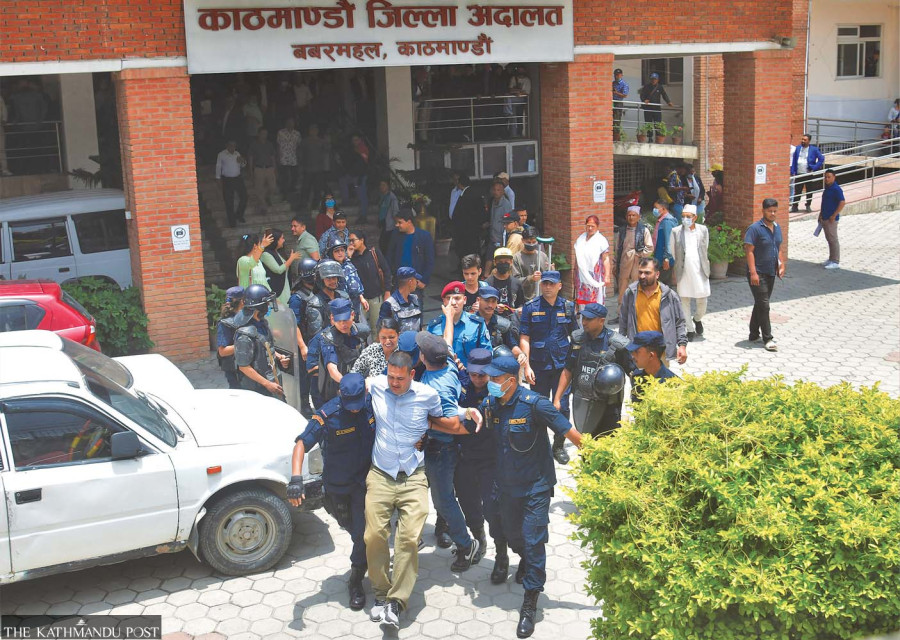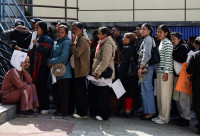National
Courts thwart Cabinet bid to protect assailants
TU teacher Prem Chalaune was brutally attacked by Congress-affiliated students three years ago and the case is still sub judice.
Tika R Pradhan
The government’s attempts to shield the assailants affiliated to the ruling Nepali Congress, who brutally attacked an assistant professor and left him for dead around three years ago, has been thwarted after timely intervention by courts.
Congress, the largest party in the federal parliament, is a major constituent of the ruling coalition led by the CPN (Maoist Centre) and has been trying hard to protect the leaders of the Nepal Students Union (NSU) involved in assaulting Tribhuvan University assistant professor Prem Bahadur Chalaune. Earlier, the party had even secured a decision to withdraw a court case against the assailants through the Office of the Attorney General.
President of the Tribhuvan University chapter of the NSU, Hari Prasad Acharya, secretary Yogendra Rawal and others had brutally thrashed Chalaune on October 6, 2020. He survived but has yet to fully recover.
While the case of attempted murder against the assailants was sub judice at the Kathmandu District Court, the government through a controversial decision on June 13, decided to withdraw the case.
The Cabinet decision was widely criticised as misuse of state power aimed at protecting party-affiliated assailants. The decision was subsequently challenged in the Supreme Court, which on June 23, quashed it through an interim order.
Justice Manoj Kumar Sharma’s single bench issued an interim order preventing the implementation of the decision to withdraw the case and ordered the defendants including the Office of the Prime Minister and the Council of Ministers to clarify their decision.
In another case, the Supreme Court on July 23 ordered the Kathmandu District Court to find out whether Section 87 of the Criminal Procedure Code 2017 should be applied or not, considering the actions of the two defendants–Sayuj Shrestha and Rabin Kumar Lama—who refused to provide interim compensation of Rs100,000 ordered by the court and have been ignoring court dates.
The Supreme Court has upheld the decision of the Patan High Court of February 25, 2021, to release Rupesh Shah, Rabin Kumar Lama, Sayuj Shrestha, Yogendra Rawal, Niraj Rana Magar and Hari Prasad Acharya on bail of Rs500,000 each and place those failing to pay the bail in judicial detention for further investigation. The high court had ordered each of the accused to pay Rs100,000 as interim (relief) compensation to the assistant professor.
Section 87 (1) of the Criminal Procedure Code 2017 states that if any accused has skipped court dates, the court may if it is of the opinion that the accused should be arrested and produced before it, issue a warrant for his or her arrest pursuant to Section 58 and order the arrest of and attachment of the property of, such accused. And sub-section 2 states that if an order is made pursuant to sub-section (1), the police shall arrest the accused, and the Land Revenue Office or other body or organisation concerned shall attach the property of the accused, in pursuance of such order.
Chalaune’s lawyer Suraj Basnet said the Supreme Court has asked the Kathmandu District Court to decide whether Section 87 of the Criminal Procedure Code 2017 is applicable against the defendants or not.
“The Supreme Court has clearly stated that the decision of the Patan High Court was correct and the Kathmandu District Court should take a decision considering the context that the two defendants have not been cooperating with the court in its efforts to impart justice,” advocate Basnet, who is also a faculty of the Kathmandu School of Law, told the Post. “In my opinion, the court has indirectly told the Kathmandu District Court to issue an arrest warrant against the accused.”
However, Minister for Law, Justice and Parliamentary Affairs Dhanraj Gurung in a recent media interview tried to justify the attack on Chalaune arguing that the assistant professor ensued the issue by breaking the padlock placed by the members of the NSU.
In the interview with Kantipur Television Minister Gurung accused Chalaune of having removed BP Koirala’s biography from the curriculum provoking the student leaders to launch a struggle against the move.
However, assistant professor Chalaune questioned whether Minister Gurung should first be aware that a teacher does not have the authority to alter the curriculum. Furthermore, the curriculum of Sociology and Anthropology does not include BP Koirala’s biography, he said.
“In his interview, the minister had a false claim that I broke the lock,” Chalaune told the Post. “Actually, I had advocated against the padlocking of the department which was my duty being a teacher but I was attacked weeks after the lock was broken, by hiring some criminals.”
For the last three years, Chalaune has been fighting not only against the assailants, but also against the ruling parties. Immediately after the Cabinet decision, he tried to stage a hunger strike at the Kathmandu District Court. But the police removed him from there. Then, he started a hunger strike on the premises of the Tribhuvan University at Kirtipur.
With the Supreme Court’s interim order, he ended his hunger strike last month.




 20.9°C Kathmandu
20.9°C Kathmandu














